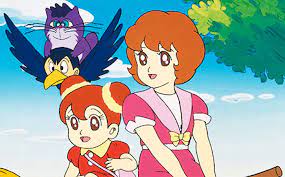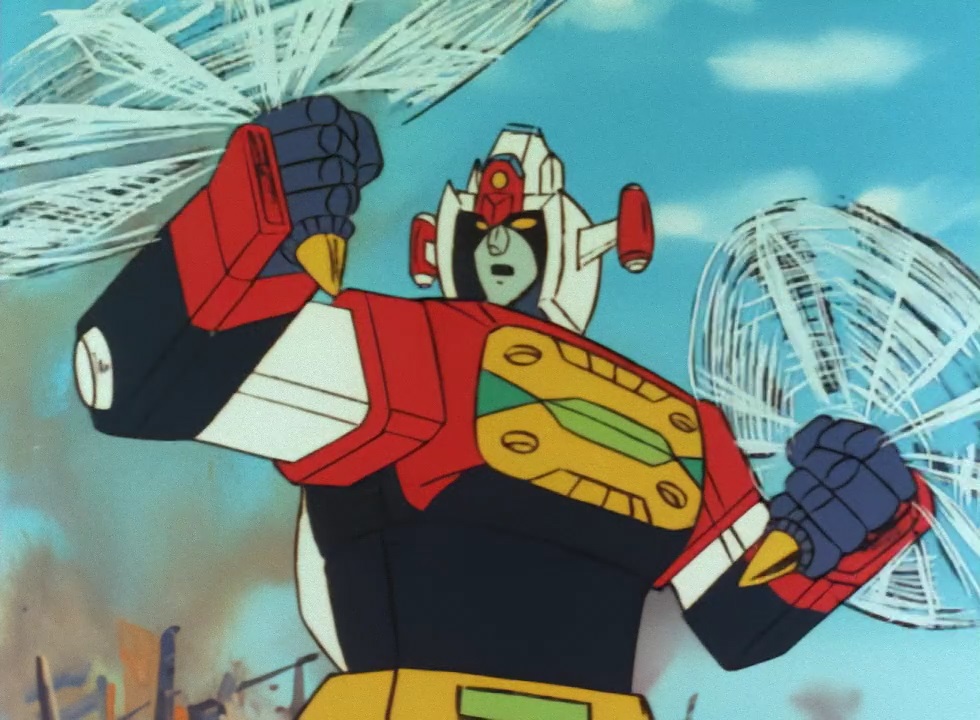Polonia 1 and Japanese Anime: How Poland Discovered Anime in the 90s
The Beginning of a Friendship – Polonia 1 Meets Anime
Anime is a distinct form of Japanese animation that, over the years, has gained increasing popularity worldwide. Although often confused with cartoons, anime stands out due to its profound themes, rich visuals, and a vast array of genres, ranging from horror to romance, fantasy to realistic drama. In Japan, anime is a vital part of pop culture, appealing to audiences of all ages, not just children.
Polonia 1 emerged as one of the pioneering private television channels in Poland, launching its operations in the early 90s. It was founded at a time when Poland was undergoing a process of political and cultural transformation, with television playing a crucial role in shaping a new national identity. Although initially focusing on diverse content, Polonia 1 soon became a trailblazer in introducing Japanese animation to Polish audiences.
The early broadcasting days of Polonia 1 were dominated by movies and series from various parts of the world. Still, it was anime that stood out as one of its most significant and characteristic programming components. For many Poles, this channel became their first encounter with Japanese culture and aesthetics.
The decision by Polonia 1 to mainstream anime in Polish television was audacious, but it proved to be a masterstroke. Not only did it introduce a unique form of entertainment, but it also sparked a new wave of interest in Japanese culture in Poland, an interest that endures to this day.
A New Era Dawns: Polish Television's Global Embrace after 1989
The cusp of the 80s and 90s marked a period of significant transformation for Polish television. Under the communist regime in the 80s, TV was closely monitored by the state and primarily served as a tool for propaganda. Shows were frequently censored, and access to international productions was limited. However, as the decade drew to a close and with ongoing political shifts in Central and Eastern Europe, Polish television began its outward-looking journey.
Poland's changing geopolitical landscape, especially the fall of the Iron Curtain, greatly influenced its culture and media. With the commencement of systemic transformation, Poland became increasingly receptive to Western influences, resulting in a broader availability of international television content. No longer were they limited to films and series from the Eastern bloc; instead, productions from Western Europe, North America, and importantly, Asia, became accessible.
Cultural influences post-1989 evolved rapidly. While Poland showed keen interest in Western pop culture, it was also intrigued by offerings from countries beyond its traditional cultural sphere. It was during this time that the first anime series began appearing on Polish TV, presenting a fresh alternative to familiar entertainment formats.
Poland's openness to the world was not merely a byproduct of its changing political scenario, but also reflected the society's deep-seated desire to engage with diverse cultures and viewpoints. In this context, Polonia 1's introduction of anime can be seen as a symbolic gesture of Poland integrating with the global pop culture community.
 Polonia 1: The Birth of Independent Television in Poland
Polonia 1: The Birth of Independent Television in Poland
Polonia 1 began its operations in 1993, emerging as one of the first non-public television channels in Poland. Founded by Italian Nicola Grauso, who saw potential in the Polish media market following the liberalization of broadcasting regulations, the channel swiftly gained popularity in many Polish regions, though initially, its reach was limited to a few larger cities. Through investments in transmitters, Polonia 1 rapidly expanded its footprint, making it accessible to a larger segment of the population.
In the media landscape of Poland in the 1990s, Polonia 1 was a trailblazer. At a time when most television channels were either state-controlled or managed by international corporations, Polonia 1 took a gamble, focusing on a diverse range of content, not only from Europe but also from other parts of the world. The channel quickly earned a reputation for being modern, though not without controversies, especially concerning the quality of some of its broadcasts.
The decision to introduce anime to Polonia 1's programming was part of a strategy to appeal to younger audiences and fill scheduling gaps resulting from acquiring more airtime. At that time, anime had become a global phenomenon, and Grauso recognized the potential in this entertainment form. Licenses for Japanese animations were relatively cheaper compared to Western productions, making them an attractive choice for a channel navigating a competitive market.
Though the decision to air anime might have been perceived as risky, it turned out to be a masterstroke. Anime drew in young viewers eager for fresh and different entertainment, solidifying Polonia 1's position in Poland's television market.
 In the Realm of Anime: How Polonia 1 Introduced Poles to Japanese Animation
In the Realm of Anime: How Polonia 1 Introduced Poles to Japanese Animation
One of the first anime series to debut on Polonia 1 was "Yattaman", known in Poland as "Brygada RR". This classic 1970s anime chronicled the adventures of two young heroes battling foes with innovative machines. Although an older production, its dynamic action and humor captivated Polish audiences.

Then there's the unforgettable "Dragon Ball". Charting the adventures of a young boy named Son Goku, it quickly won the hearts of many Poles. With thrilling battles, unique characters, and an extensive plot, "Dragon Ball" stands as a hallmark for many generations and remains one of the top-grossing anime of all time.

Why these specific titles? Decisions were largely driven by license availability and costs. As mentioned earlier, licenses for Japanese animations were relatively cheaper compared to Western productions at that time, making them a desirable choice for the budding station.
It's also worth noting that these anime had found success in other countries. "Dragon Ball", for instance, was a massive hit in countries like Spain and France. Introducing it to Poland seemed like a logical move.
Additionally, these animations revolved around universal themes - friendship, love, and the battle between good and evil - easily resonating with audiences from diverse cultures. This gave Polonia 1 confidence in their potential popularity in Poland.
In the end, the choice of these specific titles was a combination of economic factors, availability, and popularity. But regardless of the reasons, thanks to these selections, Polonia 1 secured a place in the hearts of many Poles as the channel that introduced them to the captivating world of anime.
Anime in Poland: Surprise, Fascination, and a New Wave of Interest in Japanese Culture
When the first episodes of anime began airing on Polonia 1, the reactions were mixed. For many viewers, especially the older ones, anime was something entirely new and incomprehensible. The artwork, narrative style, and cultural references were different from what Poles were accustomed to seeing on television. TV critics were divided – some praised the originality and freshness of these productions, while others criticized them for violence or cultural themes incomprehensible to Western viewers.
However, among the younger audience, anime quickly gained immense popularity. For them, it was a form of entertainment different from everything that had previously appeared on Polish television. Young people were fascinated by the colorful, dynamic characters, intricate plots, and the exotic world portrayed in these productions. Many began to identify with the characters of these stories, leading to the establishment of the first anime fan clubs, conventions, and other initiatives gathering lovers of Japanese animation.
The long-term impact of anime on Polish youth was significant. Not only did it draw them to their TVs, but it also inspired a deeper exploration of Japanese culture more broadly. Manga, Japanese music, fashion, and cuisine - interest in these aspects of Japanese culture grew with the popularity of anime. For many young Poles, anime became a gateway to experiencing the rich and diverse world of Japanese culture.
The Anime Phenomenon: The Cultural Echo of Japanese Animation in Poland in the 1990s
Japanese anime introduced many new motifs and values to Poland that were previously unfamiliar to Polish viewers. Topics related to honor, friendship, sacrifice, and striving for perfection, often present in productions like "Dragon Ball" or "Fist of the North Star," became especially popular. Principles of kendo or bushido, albeit presented in a simplified manner, became symbols of Japanese culture in the eyes of many young Poles. Anime also addressed more complex issues such as interpersonal relationships, acceptance of diversity, and internal conflicts, as seen, for example, in "Daimos."

Japanese anime also influenced the Polish art scene. Young artists, inspired by anime aesthetics and narrative, began creating their own comics and animations that drew from Japanese patterns. People like Grzegorz "Rosomak" Rosiński and Tomasz "Morfeusz" Lew Leśniak in their works referred to the aesthetics of popular 1990s Japanese productions. Music saw bands inspired by Japanese culture, while cinema and theater adapted works by Japanese creators. In this way, anime became a significant source of inspiration for Polish culture in the 1990s.
The Impact of Polonia 1 and Anime on the Polish Media Landscape
Polonia 1, being one of the first TV stations in Poland to broadcast anime, undoubtedly shaped the Polish media landscape in this area. Its success and the popularity of anime among young viewers were noted by other television stations, which began investing in Japanese animation. Channels like TVN or Polsat, seeing the growing interest in this genre, started to incorporate anime into their schedules. This paved the way for more titles that eventually became essential in youth programming.
Over the years, the trend for anime in Poland not only survived but evolved. With technological advancements and internet access, Polish fans gained even easier access to a wide range of titles across different genres. Streaming platforms, such as Crunchyroll or Netflix, began offering anime with subtitles or Polish dubbing, further boosting its popularity. Conventions like the previously mentioned Pyrkon became massive events, attracting thousands of participants from all over the country, with anime becoming a staple in pop culture.
In conclusion, the introduction of anime by Polonia 1 was a pivotal moment in Polish television history. Despite initial controversies and misunderstandings from parts of society, anime managed to win the hearts of many Poles and became a significant cultural element. What started as a little-known genre on one channel evolved into a nationwide fascination that continues to this day.
"Strong Japanese Women"
see book by the author
of the page
未開 ソビエライ
An enthusiast of Asian culture with a deep appreciation for the diverse philosophies of the world. By education, a psychologist and philologist specializing in Korean studies. At heart, a programmer (primarily for Android) and a passionate technology enthusiast, as well as a practitioner of Zen and mono no aware. In moments of tranquility, adheres to a disciplined lifestyle, firmly believing that perseverance, continuous personal growth, and dedication to one's passions are the wisest paths in life. Author of the book "Strong Women of Japan" (>>see more)
Personal motto:
"The most powerful force in the universe is compound interest." - Albert Einstein (probably)
Mike Soray
(aka Michał Sobieraj)
未開 ソビエライ
An enthusiast of Asian culture with a deep appreciation for the diverse philosophies of the world. By education, a psychologist and philologist specializing in Korean studies. At heart, a programmer (primarily for Android) and a passionate technology enthusiast, as well as a practitioner of Zen and mono no aware. In moments of tranquility, adheres to a disciplined lifestyle, firmly believing that perseverance, continuous personal growth, and dedication to one's passions are the wisest paths in life. Author of the book "Strong Women of Japan" (>>see more)
Personal motto:
"The most powerful force in the universe is compound interest." - Albert Einstein (probably)
Mike Soray
(aka Michał Sobieraj)
Write us...
Ciechanów, Polska
dr.imyon@gmail.com
___________________
inari.smart
Would you like to share your thoughts or feedback about our website or app? Leave us a message, and we’ll get back to you quickly. We value your perspective!

 Polonia 1: The Birth of Independent Television in Poland
Polonia 1: The Birth of Independent Television in Poland In the Realm of Anime: How Polonia 1 Introduced Poles to Japanese Animation
In the Realm of Anime: How Polonia 1 Introduced Poles to Japanese Animation


